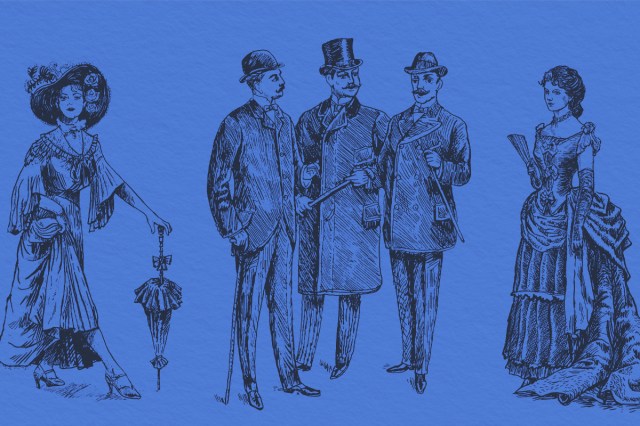
Life in the Victorian era was quite different from how we get on today. Men drank out of special teacups designed to protect their mustaches, women ate arsenic to achieve a pale complexion, and trains were thought to cause insanity. These unusual trends have since faded into obscurity, but some remnants of the past, such as the slang, deserve to be revisited. We don’t have a time machine, but we have the next best thing: We’ve pulled from the shelves a 1909 reference book, Passing English of the Victorian Era: A Dictionary of Heterodox English, Slang, and Phrase to give us insight into the slang lexicon of Victorian times.
The slang phrase “got the morbs,” from around 1880, was used by a person feeling “temporary melancholia.” In response to a greeting, a particularly glum individual might respond, “I’ve got the morbs.” The word “morbs” is an abstract noun derived from the adjective “morbid,” which represents gloom, disease, and other similarly unwholesome concepts. You could also say, “I’ve got the woefuls,” which was a popular slang alternative to “I’ve got the morbs.”
If you’ve ever heard the advice not to ask how the sausage is made — implying it’s best not to be too concerned about how something was accomplished — this is the Victorian version of that idiom. Some Victorians referred to sausages as “bags o’ mystery.” This slang term was coined around 1850, when food inspection was rare and sausages could theoretically contain anything. Even after stricter food regulations were put in place, Victorians continued to use this bit of satirical slang.
“Orf chump” was coined by stablemen talking about their horses. It means “no appetite,” with “orf” meaning “off” and “chump” referring to a meal. Be careful to avoid confusing this slang with “orf his chump,” which implies a general state of crankiness. Despite their similarities, Passing English of the Victorian Era tells us the two terms are unrelated to each other.
Few Victorian slang words are more literal than “gigglemug,” which can be split into two parts: “giggle” and “mug,” the latter of which is slang for “face.” In other words, referring to someone as a “gigglemug” means that they have a “habitually smiling face.”
“Doing the bear” isn’t an old-timey dance move — it’s a way to refer to “courting which involves hugging.” While hugging is innocent by today’s standards, it was a big deal in Victorian England. The related term “bear-hug,” which dates to a few decades earlier in 1837, likely inspired this slang.
Some Victorian slang terms don’t have an obvious origin, such as the word “chuckaboo.” While Gen Zers may refer to their best friend as their “bestie,” Victorians bestowed the title of “chuckaboo” upon their “favourite chum.” It might be a nonsense word, but it was a popular term of affection.
Have you ever heard a drunken commotion outside while you’re trying to get some rest? In Victorian times, any sort of rowdy street behavior was referred to as “mafficking.” It comes from Mafeking Night — a celebration that took place in British cities on May 17, 1900. The rejoicing took place after the lifting of a siege on a British military outpost in the South African town of Mafikeng (also spelled Mafeking).
This phrase reportedly comes from an American story about a thief who was accused of stealing four horses as well as some corn. In an effort to distract from the more egregious offense of stealing horses, the thief purportedly said that they “acknowledge the corn.” In turn, this slang came to be used more generally as a way to admit to minor wrongdoing in hopes of distracting from a larger issue.
The English phrase “batty-fang” is derived from the French battre à fin, which translates literally as “beat to an end.” The Victorians turned the French phrasing into slang meaning “to thrash thoroughly” or to really lay into someone.
Accusing someone of “making their coffin” essentially implies that their greed got the better of them. For example, if a tailor charges too much money for an alteration, the customer will probably seek out cheaper alternatives and isn’t likely to return. By charging too much, the tailor “made their coffin” and killed any future business. We still have a close version of this phrase in “you made your bed, now you must lie in it,” but we already know the Victorians had the morbs, and their slang reflected it.

















